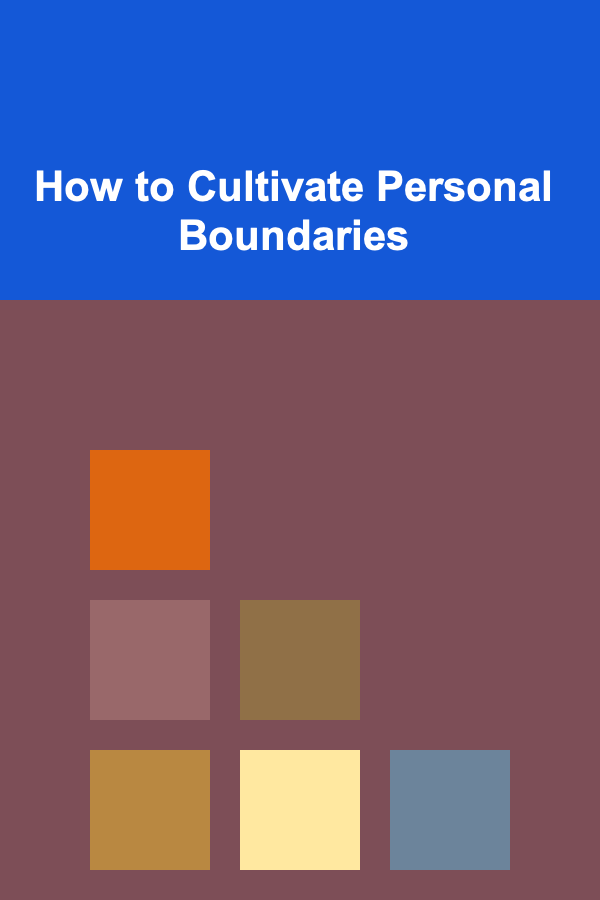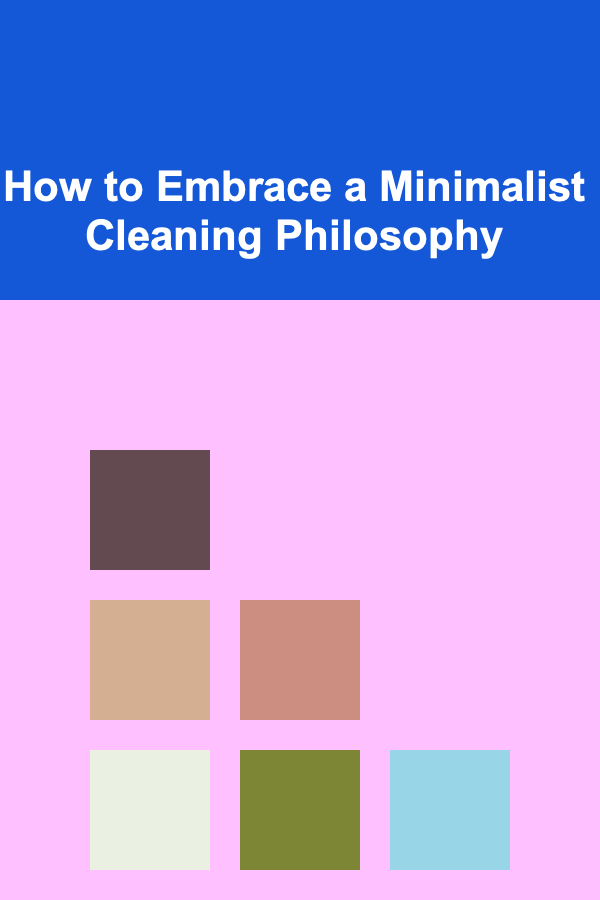
How to Cultivate Personal Boundaries
ebook include PDF & Audio bundle (Micro Guide)
$12.99$10.99
Limited Time Offer! Order within the next:

Personal boundaries are the invisible lines we draw around ourselves to define our emotional, physical, and mental limits. Cultivating healthy personal boundaries is one of the most vital aspects of maintaining emotional health, ensuring personal well-being, and fostering positive relationships. Without boundaries, we can easily become overwhelmed, burnt out, or manipulated. On the other hand, well-established boundaries give us the freedom to express ourselves authentically while respecting the needs and feelings of others.
This article will explore the concept of personal boundaries, why they are important, and how to develop and maintain them in various aspects of life, including relationships, work, and self-care.
Understanding Personal Boundaries
Personal boundaries refer to the limits or rules we set for ourselves within our relationships, work environments, and social interactions. These boundaries are personal and can vary widely from person to person, depending on individual needs, experiences, and values. They serve to protect us from overextending ourselves emotionally, physically, and mentally.
There are several types of boundaries, including:
- Physical Boundaries -- Relate to personal space and physical touch. For instance, some people may feel comfortable with close physical proximity, while others need more space.
- Emotional Boundaries -- Concerns how much emotional energy we give to others and what we allow others to take from us. Healthy emotional boundaries protect against emotional manipulation or undue influence from others.
- Mental Boundaries -- Involve the thoughts, beliefs, and opinions we allow others to influence. We should not feel obligated to adopt the opinions of others but rather be able to hold space for our own thoughts.
- Time Boundaries -- Relate to how we manage and allocate our time, including saying "no" to requests or invitations when we need to prioritize our well-being or other responsibilities.
- Material Boundaries -- Concerns the use or sharing of physical resources, such as money, possessions, or other personal items.
Boundaries aren't about building walls to keep others out; instead, they are about creating healthy limits that protect your well-being while allowing for meaningful connections with others.
The Importance of Personal Boundaries
Establishing and maintaining personal boundaries is essential for a variety of reasons:
1. Self-Respect
When we set boundaries, we are asserting that our time, energy, and feelings matter. Boundaries communicate that we value ourselves and are deserving of respect. By asserting these limits, we send a clear message to others that we will not tolerate disrespect or exploitation.
2. Emotional Health
Without boundaries, we are more likely to absorb others' emotions, take on too much responsibility, or find ourselves in toxic relationships. Healthy boundaries help us manage our emotions and reduce stress by allowing us to say "no" when necessary and avoid emotional overload.
3. Healthy Relationships
Boundaries are fundamental to creating healthy, balanced relationships. They promote mutual respect, trust, and understanding between individuals. When we maintain boundaries, we ensure that relationships are based on understanding, not coercion or emotional manipulation.
4. Avoiding Burnout
Without boundaries, it's easy to become overwhelmed by the demands of work, family, or friends. Setting clear limits helps manage the various pressures of life and reduce the risk of burnout. It ensures that you don't give more than you can handle and allows you to take time for self-care.
5. Improved Communication
Having clear boundaries enhances communication by making our needs and limits explicit to others. It helps others understand where we stand and what we need, making interactions more straightforward and less stressful.
Signs You May Have Unhealthy Boundaries
Recognizing when your boundaries are weak or unhealthy is the first step toward developing better ones. Some signs of unhealthy boundaries include:
- Constant People-Pleasing -- If you find yourself saying "yes" to everything, even when it causes you distress, you likely have weak boundaries.
- Difficulty Saying "No" -- If you feel unable to say "no" to others' requests, it can be a sign that your boundaries are not well defined.
- Feeling Overwhelmed -- If you're frequently stressed, anxious, or emotionally drained because you're taking on too much or neglecting your needs, your boundaries might need attention.
- Enabling Others' Bad Behavior -- If you allow people to treat you poorly or cross your limits without consequences, your boundaries may be too permissive.
- Feeling Taken Advantage Of -- If you often feel that others are exploiting your time, energy, or resources without reciprocating, it's a sign that you need stronger boundaries.
- Difficulty Maintaining Relationships -- If relationships seem to be consistently one-sided or emotionally draining, it could indicate a lack of personal boundaries.
Recognizing these signs is essential because it helps you understand that boundaries are not only about saying "no" but also about creating space for your needs, desires, and self-respect.
How to Cultivate Healthy Personal Boundaries
Building and maintaining personal boundaries requires self-awareness, practice, and consistent effort. Below are some steps to help you cultivate stronger boundaries:
1. Understand Your Needs and Limits
Before you can establish boundaries, you must first understand what your needs are. Take time to reflect on:
- What makes you feel comfortable or uncomfortable in various situations?
- How much time do you need for yourself, away from social obligations?
- What physical, emotional, and mental space do you need to maintain your well-being?
The better you understand your needs, the more effectively you can communicate them to others. This may require introspection and trial and error. It's important to listen to your feelings and body signals. If something feels off, it may be an indication that a boundary has been crossed.
2. Learn to Say "No"
One of the most essential skills in cultivating boundaries is learning how to say "no" without guilt or apology. Saying "no" can be difficult, especially if you're used to people-pleasing or fearing conflict. However, learning to say "no" is an act of self-care, and it's necessary for your well-being.
To say "no" effectively, you can:
- Be direct and clear: "I can't do that right now."
- Offer a polite explanation (if you feel it's necessary): "I need some time to recharge, so I'm going to have to decline."
- Stick to your decision: Don't let guilt or pressure sway you once you've decided.
3. Communicate Your Boundaries Clearly
When you set boundaries, it's essential to communicate them clearly to others. This helps avoid misunderstandings and ensures that others know where you stand. Use "I" statements to express your needs and limits. For example:
- "I need some alone time after work to recharge."
- "I'm not comfortable discussing that topic with you."
- "I can't take on any more tasks right now; I'm at capacity."
Being assertive in your communication, while also being respectful, is crucial. Setting boundaries doesn't mean being aggressive; it's about standing firm in your needs without infringing on others.
4. Respect Others' Boundaries
While cultivating your own boundaries is important, it's equally essential to respect the boundaries of others. Just as you set limits for yourself, others have their own needs and limits that should be respected. This means:
- Listening actively when someone expresses their boundaries.
- Not pressuring others into doing things they're uncomfortable with.
- Acknowledging when your behavior may be crossing someone else's boundaries.
Mutual respect for boundaries strengthens relationships and fosters trust and understanding.
5. Establish Boundaries in Relationships
In personal and professional relationships, boundaries are essential to maintain respect and avoid exploitation. Some strategies to establish healthy boundaries in relationships include:
- Be Transparent: Let people know your boundaries early on, especially in new relationships. For instance, if you value your privacy, let others know that certain topics are off-limits.
- Set Time Limits: In social settings, it's essential to set time limits to avoid overcommitting yourself. If you feel overwhelmed, don't hesitate to excuse yourself from a conversation or social event.
- Set Emotional Boundaries: Be mindful of emotional manipulation or guilt-tripping in relationships. Don't take on others' emotional burdens or allow people to project their feelings onto you.
6. Practice Self-Care
Maintaining personal boundaries is intertwined with practicing self-care. Regular self-care ensures that you're in a strong mental and emotional state to enforce your boundaries. Some self-care practices to support healthy boundaries include:
- Prioritize sleep, nutrition, and exercise to maintain physical well-being.
- Schedule regular breaks for relaxation and stress management.
- Engage in hobbies or activities that bring you joy and allow you to recharge.
By nurturing your body and mind, you'll have the energy and clarity needed to uphold your boundaries.
7. Evaluate and Adjust Boundaries as Needed
As life circumstances change, your boundaries may need to be adjusted. It's important to periodically evaluate whether your boundaries are still serving you well. For example, in a new job or relationship, you may need to reassess your boundaries to accommodate changing needs.
Being flexible and adaptable doesn't mean abandoning your boundaries but rather adjusting them as necessary to fit new situations.
8. Seek Professional Help if Necessary
Sometimes, it's difficult to establish or maintain boundaries on your own, especially if you've been in toxic or abusive relationships. In such cases, it may be helpful to seek guidance from a therapist or counselor. Therapy can help you explore past experiences, develop healthier patterns, and provide the support needed to enforce boundaries.
Conclusion
Cultivating personal boundaries is a vital aspect of leading a healthy, balanced life.

How to Embrace a Minimalist Cleaning Philosophy
Read More
How to Light Your Home Without Overwhelming the Space
Read More
How to Make the Most of Your Laundry Room Space
Read More
How to Organize Your Garden Tools and Supplies
Read More
How to Soundproof Your Home Using Simple DIY Tricks
Read More
How to Use Free Public Art Installations
Read MoreOther Products

How to Embrace a Minimalist Cleaning Philosophy
Read More
How to Light Your Home Without Overwhelming the Space
Read More
How to Make the Most of Your Laundry Room Space
Read More
How to Organize Your Garden Tools and Supplies
Read More
How to Soundproof Your Home Using Simple DIY Tricks
Read More